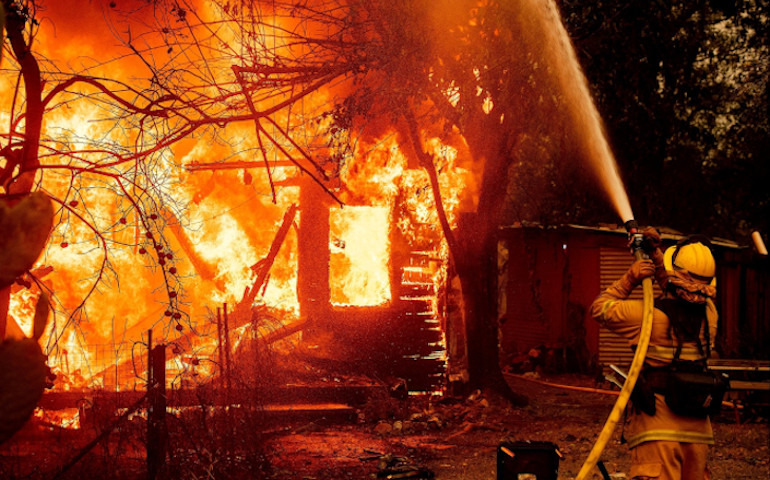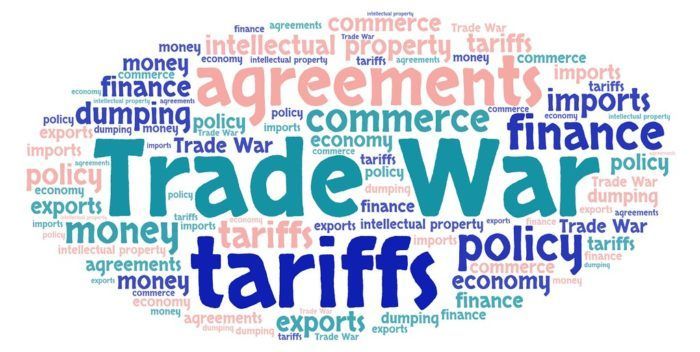Nicolas Croes is a member of Linkse Socialistiche Partij / Parti Socialiste de Lutte (ISA in Belgium).
“Life on Earth can recover from a drastic climate shift by evolving into new species and creating new ecosystems. (…) Humans cannot.” The verdict is hard. It is in the Intergovernmental Panel on Climate Change (IPCC) interim summary, leaked via Agence France Presse (AFP). Humanity’s near future is one of a climate crisis with devastating consequences. Let’s put it this way: the lack of action by governments is a crime against humanity.
A leak that says a lot
The IPCC report will not be officially published until February 2022. It will be about 4,000 pages long and will bring together scientific publications on climate produced over a period of about six years (the last report was published in 2014). It will be accompanied by a 30-page “Summary for Policymakers”, which will be discussed, as usual, by the delegations of the 197 countries of the United Nations Framework Convention on Climate Change (UNFCCC).
The fact that the report was leaked to the press is both a cry for help and an indictment. It ensures that terms like “cataclysm” are not watered down under pressure from the Gulf oil kingdoms or leading imperialist powers like the US and France, which still generously support their oil multinationals. The leak could also put a damper on the talks at the 26th UN climate conference, COP26, from 1 to 12 November in Glasgow, Scotland. The leak is a cry of despair from the scientific community, which is unable to galvanise policy makers into action. After all, traditional politicians have taken sides: that of big business.
Facing reality…
Since 1990, the number of disasters caused by climate change has tripled, forcing millions of people to move every year. The ten most expensive weather-related disasters accounted for nearly $150 billion in insurance-covered costs in 2020. These 10 disasters killed at least 3,500 people and displaced more than 13.5 million. This summer, mega-fires destroyed millions of hectares of forest from the Amazon to Siberia, while heat waves in North America and floods in Europe, including Belgium and Germany, showed that no country is immune.
Unfortunately, this is only a small beginning. Many leading scientists believe that the earth’s vital functions are weakening and fear that certain “tipping points” in the climate are imminent. To avoid this, global greenhouse gas emissions must be halved by 2030 and reach zero net emissions by 2050. This is the only way to halt and eventually reverse climate change. And it is already 2021.
… and expropriate climate criminals
The wider climate and ecological crisis must become the cornerstone on which political decision-making is based. The United States has announced that it wants to reduce its greenhouse gas emissions by 50% to 52% by 2030 compared to 2005. China aims for carbon neutrality by 2060. The European Union has announced that it wants to achieve this 10 years earlier. All these fine declarations remain extremely vague about how they will be achieved. A goal without a plan is just a wish.
The IPCC’s interim report is the first to demonstrate conclusively that there is a link between the extreme weather of the past decade and climate change, while the latter is attributed to the influence of human activities. To be able to intervene properly and draw up an effective action plan, we need to define the human activity we are talking about. This is, in fact, the great weakness of this interim report: it remains evasive about the economic system responsible for the current ecological crisis: capitalism.
We are not all equally responsible for the climate crisis. In 2017, a report by the international NGO Carbon Disclosure Project highlighted that just 100 companies were responsible for 71% of global greenhouse gas emissions between 1988 and 2015. Not surprisingly, these are mainly oil companies. How can anyone seriously imagine a solution without taking urgent action to stop them from doing harm?
Capitalist governments do worse than nothing: they encourage them. By 2019, government support for fossil fuels (especially oil) in 50 countries of the OECD, the G20 and the EU Eastern Partnership (three countries in the Caucasus, with Moldova, Ukraine and Belarus) had increased by another 5% to $178 billion. Since then, the pandemic has been seized as an opportunity by these pollution giants. Italy, for example, gave the petrochemical company Maire Tecnimont a state-guaranteed loan of EUR 365 million as part of its stimulus package. The European Central Bank has not imposed any environmental demands for its financial support of oil and gas companies such as Total, Shell, Eni, Repsol and even E.ON, a company still active in the coal industry.
Pressure is clearly not enough. We cannot control what the community does not own. These companies urgently need to be expropriated and placed under the democratic control and management of the community, so that they no longer cause damage and their reserves are confiscated to be invested in the green transition and the retraining of workers, without compensation for the big shareholders. Any so-called green project that remains silent on this issue should be seen for what it is: at best a (bad) joke, at worst a diversionary tactic.
Green capitalism is a lie
The traditional media and politicians try to convince us that the common good is the same as that of big business and its shareholders, characterised by a short-term vision aimed at the maximum appropriation of the wealth produced. Respecting this framework means going straight to the wall.
This is the reason for the blind trust in cutting-edge technologies that consume a lot of energy and scarce resources, or in an “energy transition” based on electric cars instead of public transport (to the delight of the car corporations). The rare raw materials needed to make batteries cause pollution and are detrimental to human rights. Not surprisingly, this is the approach of the ultra-millionaires Michael Bloomberg, Jeff Bezos and Bill Gates, who are all behind the mining company KoBold Metals.
The cornerstone of EU environmental policy is the principle that the polluter has to pay, which means that the polluter must bear the costs associated with the pollution he causes. In July, the European Court of Auditors issued a report which exposed the mechanism for what it is: a big sham for the benefit of big business. The costs not covered by industry amount to “hundreds of billions of euros.” The conclusion is that the state budget – and not that of the polluter – is used to finance anti-pollution measures. “In the end, the bill for the citizens of the European Union is high,” the Court laments. And according to the European Environment Agency, air pollution alone is responsible for around 400,000 premature deaths each year.
The picture would not be complete without mention of eco-taxes and all the attempts to make people feel guilty for their consumption behaviour, as if we had any say in how things are produced today! In the context of the current socio-economic crisis, new taxes of this type may well give rise to struggles that eclipse the scale of those of the French Yellow Vests in 2018.
General mobilisation for democratic planning needed
The big difference between today and the beginning of the 1990s, when the climate problem began to permeate public awareness (including with the Rio Conference in 1992), is that neoliberalism had then received a strong impetus as a result of the collapse of the alternative Soviet model. Today we have entered the “era of disorder”, characterised by a deep economic crisis and the discrediting of the neoliberal model. It is an era that brings with it many dangers (war, growth of reactionary forces, etc) but also opportunities in terms of revolutions and mass uprisings. Here lies our way out, to put an end to the capitalist exploitation of the two sources of all wealth: nature and labour.
The health crisis around Covid-19, the catastrophic climate change, the consequences of the new economic crisis, etc., make the need for democratic and ecological planning of the economy much clearer to a broader layer of society.
Meeting the climate challenge will require massive public investment in many areas. There is work to be done on a scale unparalleled in human history. This cannot be left to individual initiatives. For example, we need a plan to insulate and renovate buildings – district by district – to drastically reduce emissions from heating. We need a complete overhaul of urban and regional planning to deal with the consequences of the climate crisis. Consider that by the end of the century, rising sea levels could cause more than 200 million people to lose their homes! Eight of the ten largest cities in the world are currently situated on the coastline.
For such a long-term vision, there is no other choice than the nationalisation of all key sectors of the economy (finance, energy, etc) under democratic control and management, so that all necessary resources can be deployed. It is also the only way to put an end once and for all to the total aberration of programmed obsolescence’(production with built-in rapid replacement) and the generalised waste of the capitalist economy and imperialism. One example among many: the movement of US military troops around the world in one year alone represents as many emissions as the total of Denmark.
The transition to a carbon-free economy requires enormous efforts, which the capitalists present as a threat to jobs. Yet all studies state, for example, that the switch to 100% renewable energy worldwide, combined with retraining, would create millions of additional jobs.
On 4 September 2017, the Financial Times claimed that “The Big Data revolution can revive the planned economy.” It is clear that today’s data collection and technological capabilities can take democratic planning of the economy to unimaginable levels of efficiency. We must not leave these techniques, infrastructure and applications in the hands of private companies in Silicon Valley. Scientific research must be freed from the straitjacket of market logic. It would then become possible to carry out a central analysis of the countless data concerning the climate crisis or, for example, the Covid-19 pandemic.
However, it will not be enough to use today’s enormous technological possibilities to make planning work. No computer algorithm with a large number of variables can be effective without constant feedback from workers and users. As Russian revolutionary Leon Trotsky stated in The Betrayed Revolution, “Under a nationalized economy, quality demands a democracy of producers and consumers, freedom of criticism and initiative – conditions incompatible with a totalitarian regime of fear, lies and flattery.” He further noted that a planned economy needs democracy, like a body needs oxygen.
Democratic discussion from below must decide the form of planning, management and control to be applied by the workers and the community. At the centralised or more decentralised levels of planning, workers’ democracy will always be crucial. A centrally designed plan must be discussed, modified and corrected by a vibrant workers’ democracy, consisting of workers from the sector concerned, users and suppliers. This is the fundamental difference with the authoritarian bureaucratic planning that underpinned Stalinist economies, which were also responsible for dramatic environmental disasters.
Socialism or barbarism
Putting the workers in charge will change everything. It would allow for coordinated action on a global scale, free from the obstacle of competition between the different national capitalist classes. But in addition to making a real energy transition possible, it would also pave the way for a distribution of available work among all. We would work less in order to live better, earning enough to live a fulfilling life, free from burn-out and without the many tasks that have no real social utility.
Revolutionary socialists have long been on the defensive and their numbers have been reduced to an all-time low. But this is a new period. This is an opportunity. This is our only chance. International Socialist Alternative, will do everything in its power to direct the struggle towards the only way out of the multiple crises of capitalism: the overthrow of this barbaric system and the socialist transformation of society. Your place is in this struggle!




